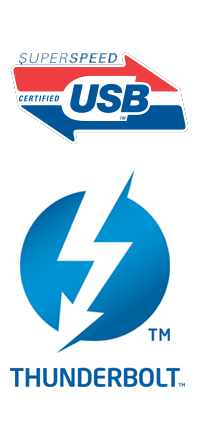Will We See Thunderbolt USB Flash Drives Any Time Soon
Last week saw the announcement by Intel of a new High Speed technology called Thunderbolt™ - its aim is to deliver high-speed data transfer capabilities and support for high-definition (HD) video connection in a single cable. The
“Thunderbolt” cable and protocol supports data transfer speeds of up to 10Gbps which put simply will enable the transfer of a full-length HD movie in around 30 seconds!
The technology has been a joint development with Apple so its no surprise that it will make its first appearance in the new MacBook Pro series which co-incidentally, was also announced last week.
Of course Apple are not new to developing new fast data transfer solutions with Firewire 400 and Firewire 800 being clear examples but this jointly developed solution leaves everything else looking like a poor relation. For example Firewire 800 supports data transfer speeds of 800 Mbps (twice that of USB 2.0) and even the new USB 3.0 standard only manages 5Gbps.
Considering USB 3.0 is only just now beginning to reach the market the announcement of Thunderbolt has taken many by surprise and raised doubt over what will emerge as the dominant standard for peripherals and data transfer moving forward.
Whilst USB 3.0 products are backwards compatible with USB 2.0 the Thunderbolt standards are completely different (different cables, different connectors and completely different protocol) so USB products, including USB flash drives will not work with Thunderbolt.
USB 3.0 flash drives are only now beginning to appear on the market and are still carrying quite a heft “early adopter” premium. Whether Thunderbolt will or can spawn an equivalent to a USB flash drive is not clear but a Thunderbolt Flash Drive with data transfer speeds of 10Gbps would revolutionise the portable data storage space.
For now most people are likely to be content with regular USB 2.0 flash drives and companies that use these USB flash drives for promotional purposes need not worry about Thunderbolt because its simply too early in its development and adoption cycle for it to be considered. For now at least USB remains king but its going to be an interesting couple of years.

